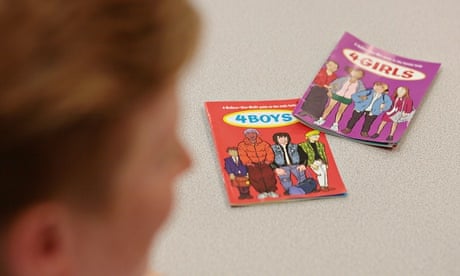At the first mention of blood one of the boys faints; by the end of the year 8 sex education lesson at Chelmsford grammar school for boys, four more have passed out. It's a record, according to the head, Tom Sherrington, whose 20 years of teaching the topic has led him to expect at least one child to keel over when he talks about menstruation.
Sherrington is an unusual headteacher, teaching a subject that is not only largely voluntary for his academy school but also controversial and complicated. When the sanitary towels come out – "a normal and natural part of life for girls" – one boy at this highly selective school puts his fingers in his ears and his head between his knees.
After the 13-year-old boys file out of the classroom, Sherrington said: "I love teaching sex ed, I think it's really important … But it has the lowest of the low priorities in terms of any scrutiny. Most people do it because it's so important but, on the ground, it's very patchy … I think sex education on average across the country is pretty crap compared with most subjects."
He is not alone in thinking sex and relationship education (SRE) is in something of a crisis in the UK. Compulsory only for a bare minimum of science topics – puberty and reproduction essentially – the subject is nevertheless at the centre of concerns about how technology is changing the way a new generation thinks about and deals with sex.
Last week, the Sex Education Forum, based at the National Children's Bureau charity, launched a campaign, It's my Right, calling for SRE to be made statutory and for more teacher training and inspections as part of its submission to the education select committee's wide-ranging inquiry into the issue. The campaign's demands for properly timetabled lessons "to address real-life issues including respectful relationships, domestic violence and consent" echo the concerns of women's rights groups such as End Violence Against Women, which believe that both boys and girls are in danger of gaining a warped sense of what constitutes normal sexual behaviour from pornography and online games.
In an attempt to understand the reality of teaching teenagers about sex and relationships today, the Guardian visited a comprehensive girls' school as well as an all-boys' school. Issues raised by the young people about sexuality and new technology were both worrying and surprising, but at both schools teachers called for the subject to be part of a bigger national discussion.
Confusion has mounted in recent years with the sense that the education secretary, Michael Gove, is increasingly laissez-faire on the topic. He did, after all, suggest that teaching academic subjects such as Latin was the best way to prevent children from indulging in "risky behaviour".
The position of Ofsted, which last year found SRE teaching "required improvement in over a third of schools", is also complicated by the fact that SRE only features in an inspection if there are fears over safety, which there were at the so-called Trojan horse schools in Birmingham. Having often said the subject had been left up to heads, Gove this week raised concerns in Westminster that these schools were "silencing girls".
Emma Renold, professor of childhood studies at Cardiff University, is among those who despair about the situation. "Failing to update and make SRE a mandatory part of the core curriculum that addresses sexual rights, sexual discrimination, sexual health and sexual wellbeing is failing to support children in navigating an increasingly complex sexual world and enduring gender and sexual inequalities."

What teachers overwhelmingly want is greater support – a survey by the PSHE Association found that 68% wanted more training in sex education. Stuart George, head of personal development at Didcot girls' school in Oxfordshire, said: "Parents would be horrified if the maths teacher had no training in maths and yet for teachers of massive issues in life – drugs, sex, things that can really affect mental health and can destroy people's lives – the attitude seems to be, 'Why would you want more training in that?'"
Andy Phippen, professor of social responsibility in IT at Plymouth University, said it was understandable that teachers were wary of talking about some of the things pupils often ask him about: porn, "sexting" and gaming. "Teachers fear that kids going home and saying, 'Sir talked about porn today' is a classic route to dismissal."
Pornography is the topic most likely to alarm both parents and the tabloid press, given the surveys that show how prevalent it is among children as young as nine. As well as horror stories such as the teenager who raped his seven-year-old sister in imitation of material he had seen online, a report from the Office of the Children's Commissioner last year found that violent and sadistic imagery seen by children risked distorting their attitudes towards relationships and sex. Yet, so little research has been done on the impact of such ubiquity that the commissioner has teamed up with the NSPCC and the British Board of Film Classification to fund an 18-month research project in the UK.
Jon Brown, head of strategy and development for the NSPCC's sexual abuse programme, said schools and parents were struggling to keep up with the pace of change potentially brought about by new technology."More often than not schools are doing a bare minimum to tick the box and feeling pretty ill-equipped for anything else."
In Chelmsford, once the windows have been opened and the colour returned to the boys' cheeks, Sherrington starts answering a selection of anonymous questions sent in by some of the assembled 13-year-olds. Some – when's the right age to have sex? Can a girl get pregnant if you have sex during her period and, by far the most common, is masturbation good or bad for you? – are timeless. Others less so. About one on oral sex he declines to read out, Sherrington said: "I've looked at some of the questions and it seems pretty clear that some of you have been exposed to pornography. I'm not going to be judgmental about that because I don't know the circumstances, but you need to understand that what you are seeing isn't what we're talking about when talking about sex in a loving relationship."
Afterwards he admitted that he had to tread a fine line. "One of the ultimate challenges is to talk about taboos in sex without making sex seem dirty and wrong."
At Didcot girls' school, perhaps surprisingly, a group of 14- and 15-year-olds said they felt porn was a tougher issue for boys to navigate. Betsy in year 10 said: "It gives boys an unreal expectation if they see things on the internet and stuff. So much of what they see everywhere is photoshopped and fake … Then when they get sexual partners they are disappointed."
Relatively blasé about porn – "I choose not to see it," said one girl – the impact of social media seemed far more pervasive among girls. One girl in year 9 talked about the trend of posting pictures of themselves in new underwear that comes from trying to ape older peers.
"If a year 11 puts a revealing picture on Facebook she's likely to get 500 likes and the year 7 sees that and wants the same," she said.
"Is it so different to putting a holiday picture of you wearing a bikini?" said another in a tone of genuine inquiry.
Both schools have had to deal with behavioural issues over smartphones – the boys viewing inappropriate material on the way to the playing fields and the girl who said she liked the attention of posting revealing pictures of herself for all to see.
George said the school had had to increase its nursing provision to deal with low self-esteem or anything else that can result from these pressures. Yet he has a positive take on some of the new developments: "It's possibly making them more open about stuff that I wouldn't have even heard of at 14."
Sex education teachers tend to be a self-selecting group who choose to deal with a difficult subject because they think it's important or they have seen it done badly. Such people don't exist at all schools.
"We need to decide what schools should be teaching beyond the main curriculum, what the priorities are for the next generation," said Sherrington. "I, for one, think sex education should be right at the top."







Comments (…)
Sign in or create your Guardian account to join the discussion